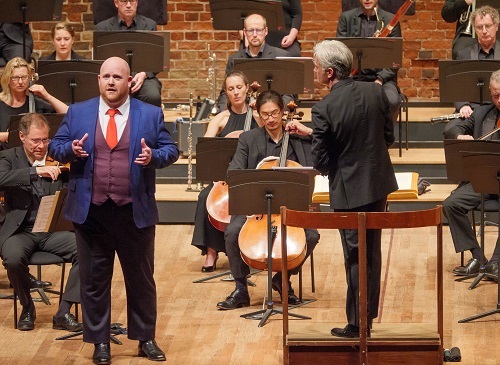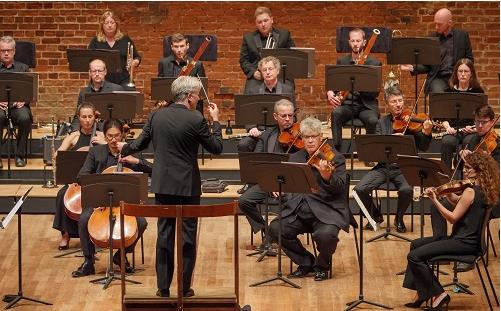It may not have been possible for Snape Maltings to host the Aldeburgh Festival this year or last, but the Maltings have not been silent and the Summer at Snape season (which continues until early September) has had a strong emphasis on both Benjamin Britten’s own music and new compositions. These two strands were brought together in this interesting programme, played with customary finesse by the London Philharmonic Orchestra under the baton of their Principal Conductor Designate, Edward Gardner.
The concert began with Changeling by Freya Waley-Cohen, a ten-minute work for chamber orchestra which was commissioned by the LA Philharmonic in 2019. Characterised by contrasts and change which somehow seems both to evolve seamlessly and take one by surprise, Changeling has a Stravinskian dynamism and crispness, and its vigour and shape were sharply controlled by Gardner. After gruffness and spikiness from the violins, the sombre murmurings of cellos and basses subdued the energy, and lovely colours were created by the juxtaposition of still string harmonics and a burbling bass clarinet melody. A bright flute and atmospheric chimes, against veiled woodwind, created mystery and introspection before the final section danced home, buoyantly underpinned by double bass and driven by bass drum – the climax of some dexterous and virtuosic percussion playing from (I think) Andrew Barclay.
Following Colin Matthews’ new arrangement for voice and strings of Britten’s 1947 song cycle, Charm of Lullabies, which was performed at the Maltings last month by soprano Kathryn Rudge and the Britten Sinfonia, it was the turn of Robin Holloway to help us hear Britten’s work anew – with a re-arrangement of Winter Words, a chamber orchestra now interpreting the narratorial and pictorial piano accompaniment. From the opening of the first song, ‘At Day Close at November’, Nicky Spence confirmed that he has the power and presence to establish the poet-speaker’s authority. Interesting harp and woodwind colours captured the sounds of the natural world – one could feel the cold wind blowing – while Spence’s nuanced feeling for the text communicated the intense but contained poignancy of passing time.

The ‘journeying boy’ at midnight on the Great Western inhabited an eerie, tense sound-world, the train’s jangles and whistles conjured by snapping pizzicato strings and shivering tremolando. The violas established a restless rolling rhythm, driven forward by Spence’s potent melismatic ‘journeying’, which surged forward with a fierce energy. Spence’s commitment to the text was superb here and he brought an operatic weight to the song, bringing to life the boy ‘Bewrapt past knowing to what he was going,/ Or whence he came’ – his listless face such a contrast to the key around his neck, ‘That twinkled gleams of the/ Lamp’s sad beams/ Like a living thing.’ In contrast, the satirical vein of ‘Wagtail and Baby’ was deftly drawn, the more lyrical string textures countered by the coolness of the marimba. Here, Spence’s mastery of the irony of Hardy’s final verse was spellbinding: the change of tone when, ‘A perfect gentleman then neared’; the dramatic and dynamic heightening of the flight of the wagtail who ‘with terror rose and disappeared’; and the quiet understanding of the closing image, ‘The baby fell a-thinking’.
In ‘The Choirmaster’s Burial’, the tenor man’s tale was re-told with tenderness and wistful pathos, woodwind warmth evoking affection for the former choirmaster, the vicar’s pompous self-righteousness getting smugly ‘stuck’ on a leaping octave. Having passed quickly over the hasty and musically unmarked burial, Spence employed a wonderfully soft intensity, enhanced by eerie strings, to describe – in a tone of hushed wonder – the image that haunted the vicar in the dead of night: ‘A band all in white/ Like the saints in church-glass,/ Singing and playing/ The ancient stave/ By the choirmaster’s grave.’
Leader Pieter Schoeman brought to life, vividly and wryly, the boy’s violin that so entrances the convict on the platform of the station at Upway, the tutti violins’ pizzicatos occasionally joining Schoeman in his twisting, leaping dance. The vibrant, more baritonal enactment of the convict’s glee – ‘This life so free/ Is the thing for me!’ – only made Spence’s gentle head voice at the close more affecting: ‘And the constable smiled, and said no word,/ As if unconscious of what he heard’. The shadows deepened through ‘Before Life and After’, the final anguished questioning, ‘how long?’, agonisingly unanswered – and made more distressing by the enlarged sonic canvas which remained airy, almost vulnerable, despite its varied hues.

There was more ‘musical narrative’ to come, in the form of Mendelssohn’s ‘Reformation’ Symphony, published as his fifth and last symphony but actually composed in 1830 by the 21-year-old composer – a devout Protestant and admirer of Bach (whose St. Matthew Passion he had recently revived in Berlin) – as a celebration of the triumph of Protestantism, on the occasion of the tercentennial of Martin Luther’s Augsburg Confession. Gardner, evidently as delighted as the musicians of the LPO to be performing before a live audience, and in advance of his full assumption of the Principal Conductor role in September, wryly commented that the orchestra had considered programming Mendelssohn’s ‘Italian’ Symphony but in the light of events (with an England-Italy football tussle about to take place at Wembley that evening) it was probably a good thing that they had opted instead for the ‘Reformation’.
Certainly the Symphony’s spirit of belief and hope suited the moment, and Gardner summoned a sure sense of ‘occasion’, the opening chorale unfolding with solemnity and assurance in the introductory Andante. The conductor’s relaxed poise and absolute command of detail was strongly felt – as when strong horn rhythms were immediately subdued by pianissimo strings, the ensemble superb. Gardner churned up Beethovian energy and argument in the ensuing Allegro con fuoco, the dynamic and restlessness bordering on fury and abandon on times – though if it felt that fragmentation might threaten, Gardner was always in consummate control.
The Scherzo was sunny and blithe, but with a real sense of purpose; tiny nuances brought about slight shifts of mood; and, the shadows were subtle, as if the sun’s rays, momentarily shrouded, easily slipped out behind the misty veil to cast their cheerful warmth. The architecture of the final movements was skilfully crafted. In the short Andante the strings’ heartfelt lyricism balanced reserved introspection with a depth of feeling. The latter pushed to the surface in strong upswells, then subsided, leaving the solo flute to introduce ‘Ein feste Berg’, inviting woodwind and lower strings to join in Luther’s chorale. Gardner brought the diverse quasi-variations together with a galvanising vigour. The driving bass line, vivid horns and brass, and muscular clarity from the strings in a taut fugato finally erupted in a spirit of uplifting positivism with the tutti statement Luther’s chorale triumphing over uncertainty and conflict – a fine augury for the LPO’s 2021/22 season which will see them return to their Southbank home, where Gardner and the orchestra will be joined by Principal Guest Conductor Karina Canellakis and Vladimir Jurowski in his new role of Conductor Emeritus.
Claire Seymour
Nicky Spence (tenor), Edward Gardner (conductor), London Philharmonic Orchestra
Freya Waley-Cohen – Changeling, Britten arr. Holloway – Winter Words (world premiere), Mendelssohn – Symphony No.5, ‘Reformation’
Snape Maltings, Snape; Sunday 11th July 2021 (3pm).
ABOVE: Nicky Spence, Edward Gardner and the LPO at Snape Maltings Concert Hall (c) Beki Smith